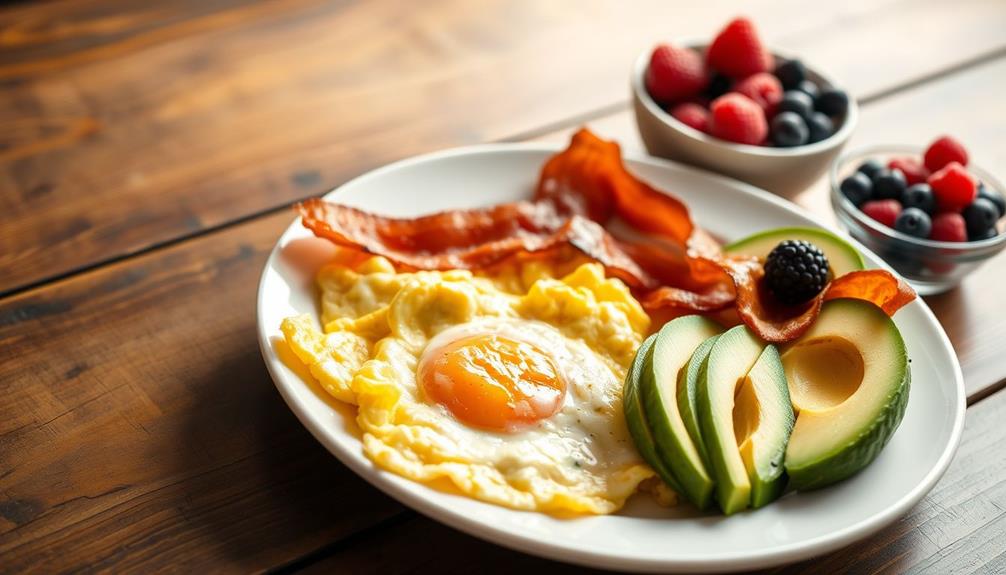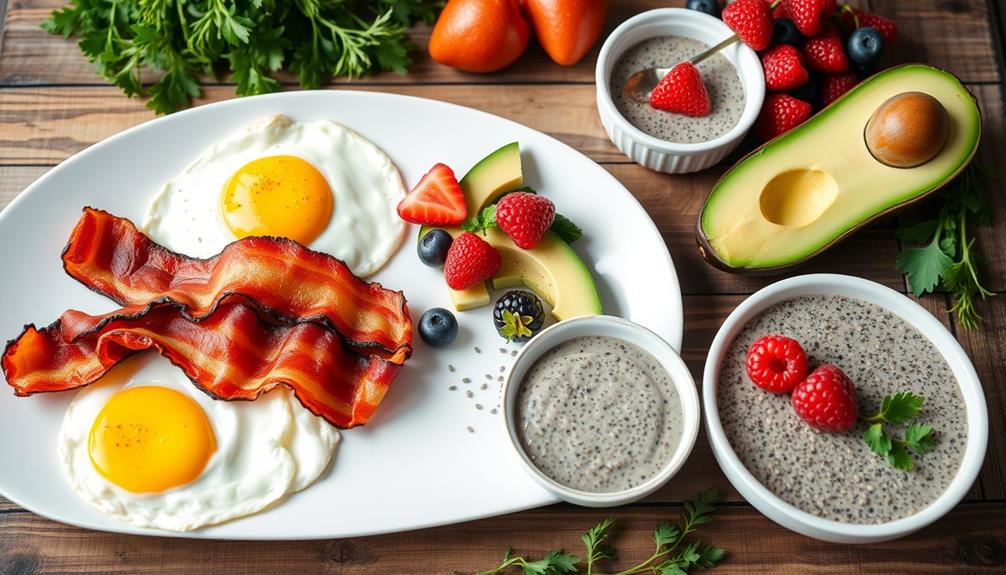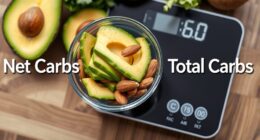If you're not losing weight on the keto diet, you might be facing several challenges. High carb intake, even from hidden sources, can stall ketosis. You may also be consuming more calories than you realize, especially from high-fat foods. Nutrient-poor choices and overconsumption of protein can hinder your progress too. Insufficient physical activity or stress may impact your hormonal balance and cravings. Finally, unrealistic expectations can lead to disappointment when weight loss slows. By exploring these factors, you can adjust your approach for better results. There's more to uncover to optimize your keto journey.
Key Takeaways
- High carbohydrate intake from hidden sources can prevent you from achieving ketosis, hindering weight loss efforts.
- Consuming excess calories from high-fat foods can disrupt your calorie deficit, essential for weight loss on the keto diet.
- Poor food choices, including processed foods, can lead to nutrient deficiencies and negatively impact weight loss.
- Overconsumption of protein may convert excess protein to glucose, disrupting fat burning and ketosis.
- Insufficient physical activity limits calorie expenditure, making it harder to lose weight while on the keto diet.
High Carb Intake

High carb intake can be a significant roadblock on your keto journey. The ketogenic diet typically limits your carb intake to 20-50 grams per day. If you exceed this range, your body struggles to enter ketosis, where fat becomes your primary fuel. Hidden carbs in sauces, dressings, and certain vegetables can sneak into your meals, making it essential to track net carbs closely.
Even small portions of high-carb foods, like a single banana or a cup of cooked rice, can derail your weight loss efforts. Additionally, consuming foods high in carbohydrates can lead to spikes in blood glucose levels, which may hinder your metabolism and overall health, including your ability to detoxify effectively, as shown in the benefits of celery juice.
When you consume too many carbs, your blood glucose levels can spike, triggering insulin release. This hormone promotes fat storage instead of burning it, which is the opposite of what you want on a keto diet.
To prevent this, it's crucial to utilize macronutrient tracking apps. These tools help you monitor your carb intake and avoid unintentional consumption that disrupts ketosis. Staying vigilant about hidden carbs and making informed choices will support your journey to achieve and maintain ketosis, ultimately aligning your diet with your weight loss goals.
Excess Caloric Consumption

Even if you're sticking to the ketogenic diet, you might still struggle with weight loss if you're consuming excess calories. The high-fat nature of keto means foods like nuts and avocados can lead to excess caloric consumption, which can sabotage your efforts. To achieve a calorie deficit necessary for weight loss, you need to monitor your total daily caloric intake carefully.
Understanding common financial terms can help you better manage your resources, including your dietary choices.
The typical macronutrient ratios on keto—70-80% fat—can easily result in overeating if you're not mindful of portion sizes. Even healthy fats can contribute to a caloric surplus, preventing you from making any weight loss progress. Tracking how much you're consuming versus how much you're burning is vital.
As you lose weight, your caloric needs may change, so regularly reassessing your intake is important. If you find that you're still not losing weight, it might be time to re-evaluate your portion sizes and the overall balance of your meals.
Focus on whole foods and be aware of the calorie density in your diet to guarantee that you're truly supporting your weight loss goals on keto.
Nutrient-Poor Food Choices

While the ketogenic diet can be effective for weight loss, choosing nutrient-poor foods can derail your progress. Relying on processed foods often leads to nutrient deficiencies, depriving your body of essential vitamins and minerals essential for overall health.
Diets high in processed meats and fats can introduce inflammatory compounds that hinder your weight loss and well-being. Moreover, understanding the importance of hydration and proper nutrition is fundamental to support your weight loss journey, as seen in gout nutrition guidelines.
Low fiber intake from these poor food choices can negatively affect digestion and nutrient absorption, leaving you feeling sluggish and hungrier. Instead, prioritize whole, nutrient-dense foods like avocados, nuts, and leafy greens.
These high-quality foods not only enhance your nutrient intake but also support metabolic health, leading to better weight loss outcomes. Incorporating non-starchy vegetables into your meals boosts fiber, vitamins, and antioxidants, which can improve your metabolism and overall health.
Overconsumption of Protein

Many people underestimate the impact of protein on their ketogenic journey. While protein is essential, overconsumption of protein can derail your weight loss goals. The keto diet is designed to consist of about 70-80% fat, 10-20% protein, and just 5-10% carbs.
To maintain ketosis and effectively burn fat, you should limit your protein intake to roughly 20% of your total daily calories. This balance is vital as insights into authenticity and existence can also apply to our dietary choices, prompting us to reflect on how our eating habits align with our personal goals.
For a typical 2,000-calorie diet, that means around 75 grams of protein. When you consume more than this, your body may convert the excess protein into glucose via gluconeogenesis, which disrupts fat burning.
Additionally, many high-protein foods, like certain meats and dairy, can contain hidden carbs, complicating your efforts to stay in ketosis. Regularly monitoring protein intake is essential.
If you find yourself consuming a caloric surplus, it could hinder your path to healthy weight loss. Balance your fat intake and keep an eye on your protein sources to guarantee you're supporting your weight loss goals without inadvertently sabotaging your progress.
Insufficient Physical Activity

If you're not losing weight on the keto diet, consider your level of physical activity.
Regular exercise is key to creating a calorie deficit, and incorporating strength training can boost your metabolism. Engaging in practices like yoga can also enhance your overall wellness and support your weight loss journey, as it promotes both physical and mental balance yoga for back pain.
Without sufficient movement, your weight loss efforts may stall, so it's time to get moving.
Importance of Regular Exercise
Regular exercise plays an essential role in your success on the keto diet, as it directly impacts your ability to lose weight. Engaging in regular exercise enhances calorie expenditure, helping you create the caloric deficit necessary for effective weight loss.
Incorporating elements like music therapy integration into your routine can also uplift your mood and motivation, making it easier to maintain an active lifestyle. When you incorporate both cardiovascular activities and strength training, you not only burn calories but also increase your muscle mass, which can boost your metabolism and promote more effective fat burning.
If you lead a sedentary lifestyle, your metabolic rate may decrease, making it more challenging to shed pounds, even on a low-carb diet like keto. Additionally, engaging in physical activity can alleviate symptoms of the "keto flu," improving overall energy levels and helping you stick to your diet.
Studies show that individuals who combine diet and exercise experience greater weight loss success than those who rely solely on dietary changes.
To maximize your results on the keto diet, prioritize incorporating regular exercise into your routine. Whether it's brisk walking, cycling, or any form of physical activity, staying active will support your weight loss efforts and enhance your overall well-being.
Incorporating Strength Training
Incorporating strength training into your routine can greatly enhance your weight loss efforts on the keto diet. By engaging in resistance exercises at least 2-3 times a week, you'll increase muscle mass, which boosts your metabolism and enhances calorie burning. This is essential, especially since a low-calorie diet can lead to muscle loss, hindering your overall progress.
In addition, understanding the significance of key domains of development can provide insights into how physical activity influences overall growth and health across the lifespan.
Research shows that strength training not only preserves lean muscle but also improves your resting metabolic rate, meaning you'll burn more calories even while at rest. This calorie-burning effect is crucial for effective weight loss.
Moreover, strength training enhances insulin sensitivity, making it easier for your body to maintain ketosis and efficiently burn fat on the ketogenic diet.
Combining strength training with your keto plan can lead to significant fat loss while simultaneously building strength and improving your body composition.
So, don't overlook the importance of incorporating resistance exercises into your fitness routine. By doing so, you'll maximize your weight loss potential on the keto diet and achieve the results you desire.
Start lifting weights today and watch your progress soar!
Stress and Hormonal Imbalances

Stress can wreak havoc on your hormones, especially cortisol, which may lead to cravings for high-carb foods that sabotage your keto goals.
Individuals with emotional dysregulation, such as those with Borderline Personality Disorder (BPD), often experience heightened stress responses that can exacerbate these cravings.
Hormonal imbalances like leptin resistance can keep your appetite in overdrive, making it tough to lose weight even when you're eating fewer calories.
Addressing these stressors is vital for restoring balance and getting your weight loss back on track.
Cortisol and Weight Gain
While you may be following the ketogenic diet diligently, elevated cortisol levels from chronic stress can sabotage your weight loss efforts. High cortisol can lead to increased fat storage, especially in your abdominal area, making it harder to shed pounds.
It also promotes insulin resistance, causing fluctuating blood sugar levels that trigger cravings for high-carb foods, which can derail your keto adherence. Additionally, understanding the emotional and psychological aspects of weight management is essential, as stress can have both mental and physical repercussions on your health, similar to the support needed in end-of-life care options.
Here are three ways cortisol impacts your weight loss journey:
- Increased Hunger: Chronic stress can alter appetite-regulating hormones, making you feel hungrier and complicating your ability to maintain a calorie deficit.
- Fat Storage: Elevated cortisol can encourage your body to store fat rather than burn it, prioritizing glucose as a fuel source and hindering ketosis.
- Cravings for Unhealthy Foods: Stress-induced cravings can lead you to seek out high-carb foods, undermining your commitment to the ketogenic diet.
To improve your hormonal balance and enhance your weight loss efforts, consider managing stress through meditation, regular exercise, and ensuring you get proper sleep.
Addressing cortisol levels may be key to achieving your weight loss goals on the keto diet.
Hormonal Disruptions and Appetite
When you're trying to lose weight on the keto diet, hormonal disruptions can play a significant role in your appetite and overall progress. Chronic stress can elevate cortisol levels, which may increase insulin resistance and drive your hunger, making weight loss harder. Hormonal imbalances, like those from PCOS or hypothyroidism, can interfere with metabolism and fat storage.
Sleep deprivation further complicates matters by affecting hormones like ghrelin and leptin, which regulate appetite. This imbalance can lead to increased hunger and cravings for high-carb foods, disrupting ketosis and stalling your progress. Leptin resistance, often resulting from stress and poor sleep, can cause persistent hunger and reduced energy expenditure, making it even tougher to shed those pounds.
| Issue | Effect on Appetite | Impact on Weight Loss |
|---|---|---|
| Elevated cortisol | Increased hunger | Slower fat loss |
| Insulin resistance | Cravings for carbs | Difficult to maintain ketosis |
| Leptin resistance | Persistent hunger | Reduced energy expenditure |
| Sleep deprivation | Increased ghrelin levels | Potential weight gain |
Addressing these hormonal disruptions is essential for achieving your weight loss goals on the ketogenic diet.
Sleep Quality Issues

Sleep quality plays an important role in your weight loss journey on the keto diet. If you're not getting adequate sleep, you may struggle to lose weight due to several physiological factors. Poor sleep disrupts insulin function and metabolism, making it harder to burn fat effectively.
Plus, it can increase ghrelin levels, the hunger hormone, leading to heightened appetite and potential overeating. Additionally, incorporating stress-reducing practices, such as using essential oils like lavender oil for relaxation, can improve sleep quality and support your weight loss efforts.
Here's how sleep affects your weight loss:
- Cortisol Levels: Lack of sleep can elevate cortisol levels, promoting fat storage, especially in the abdominal area, which counters the fat-burning effects of ketosis.
- Physical Activity: When you're sleep-deprived, your energy levels plummet, decreasing motivation for physical activity, a key component for weight loss on the keto diet.
- Hormonal Balance: Insufficient sleep can create a hormonal imbalance that hinders your weight loss efforts, making it essential to aim for 7-9 hours of quality sleep each night.
Hidden Food Intolerances

Your weight loss journey on the keto diet may also be hindered by hidden food intolerances that often go unnoticed. These intolerances, like those to gluten or dairy, can lead to inflammation and bloating, making it tough to shed pounds. Symptoms such as fatigue and cravings can undermine your adherence to the diet.
To identify such issues, consider keeping a food diary. Tracking what you eat and how you feel can help pinpoint problematic foods. Below is a simple guide to assist you:
| Food Item | Symptoms | Action |
|---|---|---|
| Gluten | Bloating, Fatigue | Eliminate for 2 weeks |
| Dairy | Cravings, Inflammation | Consider lactose-free options |
| Eggs | Digestive Issues | Try an elimination diet |
| Nuts | Skin Reactions | Monitor reactions |
| Nightshades | Joint Pain | Remove and reintroduce slowly |
Consulting healthcare professionals can also provide valuable insights, including allergy tests and tailored elimination diets. Addressing these hidden food intolerances can greatly improve nutrient absorption and enhance your ketogenic diet experience, ultimately supporting your weight loss goals.
Unrealistic Weight Loss Expectations

While it's tempting to expect quick results on the keto diet, setting unrealistic weight loss goals can lead to disappointment and frustration. Sustainable weight loss typically occurs at a rate of 1-3 pounds per week, so it's important to adjust your expectations.
Here are three key points to keep in mind:
- Initial Weight Loss: Many people experience rapid weight loss initially, mainly due to water weight. This quick drop doesn't necessarily reflect fat loss, so don't get discouraged if it slows down.
- Individual Variation: Your results depend on several factors, including adherence to the diet plan, your metabolism, and lifestyle choices. What works for one person may not work for you, so set achievable goals.
- Plateaus Are Normal: Weight loss plateaus can happen, even when you're in ketosis. It's vital to focus on patience and consistency rather than just the scale.
Frequently Asked Questions
Can You Be in Ketosis and Still Not Lose Weight?
Yes, you can be in ketosis and still not lose weight. Factors like calorie intake, hormonal imbalances, high protein consumption, processed foods, and psychological influences can all prevent you from shedding pounds effectively.
How Can I Speed up Weight Loss on Keto?
To speed up weight loss on keto, stick to 20-50 grams of carbs daily, incorporate intermittent fasting, increase your exercise routine, focus on whole foods, and stay hydrated to support your weight loss journey effectively.
Why Am I Stuck Not Losing Weight on Keto?
You might be stuck because you're not tracking calories accurately, consuming hidden carbs, or exceeding protein limits. Additionally, stress and lack of exercise can hinder your progress, so reassess your approach and make necessary adjustments.
Why Am I Eating Low Carb but Not Losing Weight?
You might be eating low-carb but not losing weight due to hidden carbs, excessive calorie intake, or too much protein. Consider tracking your food, limiting snacks, and consulting a doctor if hormonal issues arise.
Conclusion
As you navigate the winding path of the keto diet, remember it's not just about cutting carbs. Picture a garden: if you overwater it or plant too close together, the flowers struggle to bloom. Likewise, your body needs balance—watch your portions, choose nutrient-rich foods, and keep stress at bay. Nurturing your health requires patience and care, allowing your efforts to blossom into sustainable weight loss, rather than chasing the fleeting shadows of quick fixes.









